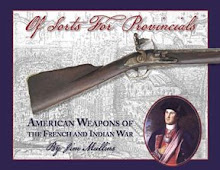On October 10th, 1756, Colonel George Washington sent an express to Lt. Governor Robert Dinwiddie including an overview of his "remarks and observations on the situations of our frontiers". Washington had left his quarters in Winchester for Augusta Courthouse (Staunton) in late September. Hoping to gather a large militia force to "scour the woods,..and,... fall in with the enemy", he waited in vain for several days before proceeding with only five men including Virginia Ranger Captain and militia officer William Preston to Colonel Buchanan's house at Looney's Ferry (modern Buchanan Virginia).
A modern, conjectural sketch of William Preston as a Virginia Ranging company officer, ca. 1756
From there he rode roughly 60 miles away to the modern town of Shawsville, Virginia at "Vass's, on the Roanoke" where Virginia Provincial Captain Hogg was [re] building a fort." The earlier Fort at Vass or Vause/Vauxe/etc. (termed a "blockhouse" in the Boston and NY papers) was burned in a June 1756 raid by a war party led by Battle of the Monongahela veteran François-Marie Picoté, sieur de Belestre II- likely the southernmost attack conducted by Canadian troops in that war. Some of the prisoners from the Fort were carried into captivity as far off as Detroit and Quebec. Ranging Company Sergeant Peter Luney testified that he lost “a rifle Gun of the value of Four Pounds ten Shillings” when he was captured at Fort Vause.
A 1740s French Marine musket, the stock is branded "Au Roy" Private Collection.
Belestre would be in Virginia again after an unsuccessful raid on Fort Cumberland, Maryland in 1757; this time as a prisoner of the Virginia Provincials at Fort Loudon in Winchester. Belestre's nephew, Philippe Dagneau of Saussaye, St. Ours and three French soldiers were killed in the same ambush . Washington's account of Belestre's (aka "Velistre") capture can be found here and there is also his June 20th, letter mentioning Belestre's interrogation.
Washington reported that "We got safely to Vass's, where Captain Hogg, with only eighteen of his company, was building a fort, which must employ him till Christmas without more assistance."
Hogg would eventually be relieved of his command, and an interesting Inventory of the Stores Belonging to ye Garrison at Vasses survives from the next year when he was forced by Washington to relinquish the fort to Captain Thomas Bullitt.
After a disappointing tour of Hogg's efforts, Washington reported that "From Vass's I came off with a servant and a guide, to visit and range of forts in this country; and in less than two hours after, two men were killed along the same road." Then on to "within five miles of the Carolina line, as I was proceeding to the southernmost fort in Halifax, I met Major Lewis on his return from the Cherokees, with seven men and three women only of that nation."
Washington's final stop was Fort Trial in Halifax (near modern Martinsville). Fort Trial was later described by J.F.D. Smyth as "... a quadrangular polygon, inclosed with large timber, and cuts of trees split in two, about twelve or fixteen feet high above the ground, standing erect, and about three or four feet in the earth, and quite close together, with loop holes cut through about four or five feet from the ground for small arms. There was also something like a bastion at each angle, which, however, could scarcely be faid to flank the curtains; and a log-house, musket proof, on each side of the gate. ". Within the area, nearly in the centre, was a common house framed and boarded, filled in, to the height of fix feet, with stones and clay on the inside, as a de- fence against small arms; it was covered only with shingles made of pine, which could be easily fet on fire as well as every other part of the whole structure, without exception."
After leaving Fort Trial, Washington continued on to Captain Preston's Garrison on the Catawba, Fort William.
GW To ROBERT DINWIDDIE Winchester, November 9, 1756.
Honble. Sir: In mine
from Halifax I promised your Honor a particular detail of my remarks
and observations upon the situation of our frontiers, when I arrived
at this place. Although I was pretty explicit in my former, I cannot
avoid recapitulating part of the subject now, as my duty, and
its importance for redress are strong motives.






